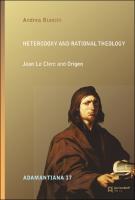Heterodoxy and Rational Theology
Jean Le Clerc an Origen
| dc.contributor.author | Bianchi, Andrea | |
| dc.date.accessioned | 2024-02-15T11:18:02Z | |
| dc.date.available | 2024-02-15T11:18:02Z | |
| dc.date.issued | 2022 | |
| dc.identifier | ONIX_20240215_9783402137338_19 | |
| dc.identifier | OCN: 1394119647 | |
| dc.identifier.issn | 2510-3954 | |
| dc.identifier.uri | https://library.oapen.org/handle/20.500.12657/87728 | |
| dc.language | German | |
| dc.relation.ispartofseries | Adamantiana | |
| dc.subject.classification | thema EDItEUR::Q Philosophy and Religion::QR Religion and beliefs::QRM Christianity | en_US |
| dc.subject.classification | thema EDItEUR::Q Philosophy and Religion::QR Religion and beliefs::QRV Aspects of religion::QRVG Theology | en_US |
| dc.subject.other | Jean Le Clerc | |
| dc.subject.other | Origen | |
| dc.subject.other | Arminian Church | |
| dc.subject.other | Human Freedom | |
| dc.subject.other | Divine Agency | |
| dc.subject.other | Predestination | |
| dc.title | Heterodoxy and Rational Theology | |
| dc.title.alternative | Jean Le Clerc an Origen | |
| dc.type | book | |
| oapen.abstract.otherlanguage | Despite his controversial reputation, Origen of Alexandria (185–253) was very much present in 17th- century religious debates. His official condemnation by the Church was a stain on his theological and exegetical reputation, yet his work remained a source of inspiration for some. For others, he was a heretic to be refuted. In Jean Le Clerc (1657–1736), a Swiss born Dutch Biblical scholar and literary journalist, we find elements from both camps although their opinions are not given equal weight, and he made a clear-cut assessment of Origen’s condemnation. As a member of the Arminian Church, Le Clerc had to defend his religious affiliation throughout his life, especially rejecting the predominating Reformed views on such hotly debated topics such as human freedom, divine agency and predestination. He also had to protect his theological reputation from other accusations of heterodoxy, especially Socinianism. Surprisingly, Origen became a key ally in Le Clerc’s struggle, despite the fact that he had to utilise the Alexandrian’s thought in nuanced ways and to communicate it with great care in order to discourage frontal attacks on himself based on Origen’s reputation and work. | |
| oapen.identifier.doi | 10.17438/978-3-402-21812-9 | |
| oapen.relation.isPublishedBy | fb17cfa5-9e40-4113-a5ce-80325c535538 | |
| oapen.relation.isFundedBy | 178e65b9-dd53-4922-b85c-0aaa74fce079 | |
| oapen.relation.isbn | 9783402137338 | |
| oapen.relation.isbn | 9783402137345 | |
| oapen.collection | European Research Council (ERC) | |
| oapen.imprint | Aschendorff Verlag | |
| oapen.series.number | 17 | |
| oapen.pages | 320 | |
| oapen.place.publication | Münster | |
| oapen.grant.number | 676258 |

